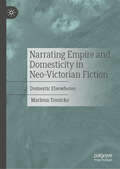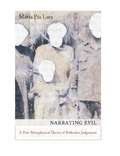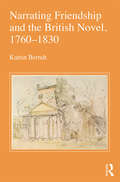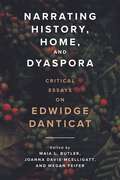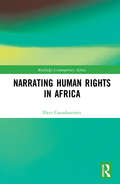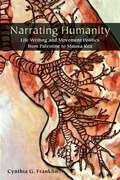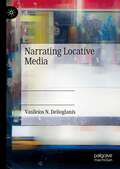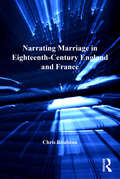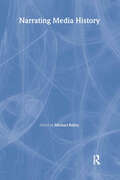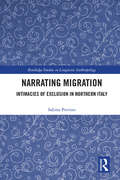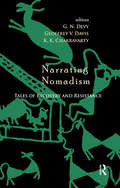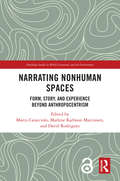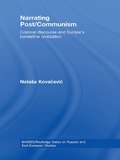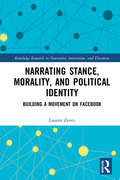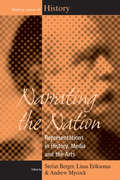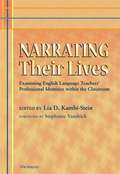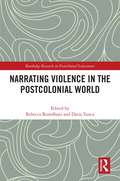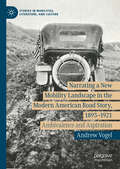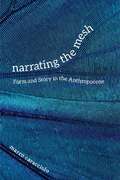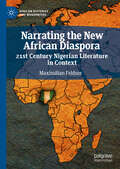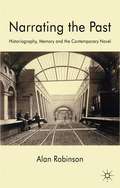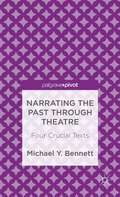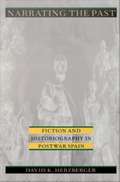- Table View
- List View
Narrating Empire and Domesticity in Neo-Victorian Fiction: Domestic Elsewheres
by Marlena TronickeFiction classified as &‘neo-Victorian&’ has steadily emerged as a crucial mode of British cultural production. It is no coincidence that this most recent Victorian renaissance is taking shape in a climate of widespread empire nostalgia, with imperial-colonial legacies being relegated to a distant &‘elsewhere.&’ In its critical re-visitations of the nineteenth century, neo-Victorianism has the potential to intervene in this often selective memory of Britain&’s imperial past. Nevertheless, systematic re-readings of empire have so far played a comparatively minor role in neo-Victorian scholarly debate. This monograph addresses this lacuna by examining how neo-Victorianism negotiates constructions of empire in conjunction with the domestic. Drawing on a range of neo-Victorian novels as well as their Victorian intertexts and bringing these into dialogue with postcolonial theory, it asks how neo-Victorian fiction engages with, perpetuates, or subverts Victorian imaginaries of urban British &‘centres&’ in opposition to remote imperial &‘margins.&’ It examines why domesticity – broadly understood as ideologically charged concepts of family, home, and belonging based on formations of gender, sexuality, and class – can never be constituted independently of empire. In addition, the book raises questions regarding neo-Victorianism&’s larger potentiality of narrating empire, suggesting that it is precisely the disorienting moments that constitute a characteristically neo-Victorian mode of exploring the entanglements of empire and domesticity.
Narrating Evil: A Postmetaphysical Theory of Reflective Judgment (New Directions in Critical Theory #20)
by Maria LaraConceptions of evil have changed dramatically over time, and though humans continue to commit acts of cruelty against one another, today we possess a clearer, more moral way of analyzing them. In Narrating Evil, María Pía Lara explores what has changed in our understanding of evil, why the transformation matters, and how we can learn from this specific historical development.Drawing on Immanuel Kant's and Hannah Arendt's ideas about reflective judgment, Lara argues that narrative plays a key role in helping societies acknowledge their pasts. Particular stories haunt our consciousness and lead to a kind of examination and dialogue that shape notions of morality. A powerful description of a crime can act as a filter, helping us to draw conclusions about what constitutes a moral wrong, and public debates over these narratives allow us to construct a more accurate picture of historical truth, leading to a better understanding of why such actions are possible.In building her argument, Lara considers Greek tragedies, Shakespeare's depictions of evil, Joseph Conrad's literary metaphors, and movies that portray human cruelty. Turning to such philosophers and writers as Jürgen Habermas, Walter Benjamin, Primo Levi, Giorgio Agamben, and Ariel Dorfman, Lara defines a reflexive relationship between an event, the narrative of the event, and the public reception of the narrative, and she proves that the stories of perpetrators and sufferers are always intertwined.The process of disclosure, debate, and the public fashioning of collective judgment are vital methods through which we make sense not only of new forms of cruelty but of past crimes as well. Narrating Evil describes the steps of this process and why they are a crucial part of our attempt to build a different, more just world.
Narrating Friendship and the British Novel, 1760-1830
by Katrin BerndtFriendship has always been a universal category of human relationships and an influential motif in literature, but it is rarely discussed as a theme in its own right. In her study of how friendship gives direction and shape to new ideas and novel strategies of plot, character formation, and style in the British novel from the 1760s to the 1830s, Katrin Berndt argues that friendship functions as a literary expression of philosophical values in a genre that explores the psychology and the interactions of the individual in modern society. In the literary historical period in which the novel became established as a modern genre, friend characters were omnipresent, reflecting enlightenment philosophy’s definition of friendship as a bond that civilized public and private interactions and was considered essential for the attainment of happiness. Berndt’s analyses of genre-defining novels by Frances Brooke, Mary Shelley, Sarah Scott, Helen Maria Williams, Charlotte Lennox, Walter Scott, Jane Austen, and Maria Edgeworth show that the significance of friendship and the increasing variety of novelistic forms and topics represent an overlooked dynamic in the novel’s literary history. Contributing to our understanding of the complex interplay of philosophical, socio-cultural and literary discourses that shaped British fiction in the later Hanoverian decades, Berndt’s book demonstrates that novels have conceived the modern individual not in opposition to, but in interaction with society, continuing Enlightenment debates about how to share the lives and the experiences of others.
Narrating History, Home, and Dyaspora: Critical Essays on Edwidge Danticat
by Thadious M. DavisContributions by Cécile Accilien, Maria Rice Bellamy, Gwen Bergner, Olga Blomgren, Maia L. Butler, Isabel Caldeira, Nadège T. Clitandre, Thadious M. Davis, Joanna Davis-McElligatt, Laura Dawkins, Megan Feifer, Delphine Gras, Akia Jackson, Tammie Jenkins, Shewonda Leger, Jennifer M. Lozano, Marion Christina Rohrleitner, Thomás Rothe, Erika V. Serrato, Lucía Stecher, and Joyce White Narrating History, Home, and Dyaspora: Critical Essays on Edwidge Danticat contains fifteen essays addressing how Edwidge Danticat’s writing, anthologizing, and storytelling trace, (re)construct, and develop alternate histories, narratives of nation building, and conceptions of home and belonging. The prolific Danticat is renowned for novels, collections of short fiction, nonfiction, and editorial writing. As her experimentation in form expands, so does her force as a public intellectual. Danticat’s literary representations, political commentary, and personal activism have proven vital to classroom and community work imagining radical futures. Among increasing anti-immigrant sentiment and containment and rampant ecological volatility, Danticat’s contributions to public discourse, art, and culture deserve sustained critical attention. These essays offer essential perspectives to scholars, public intellectuals, and students interested in African diasporic, Haitian, Caribbean, and transnational American literary studies. This collection frames Danticat’s work as an indictment of statelessness, racialized and gendered state violence, and the persistence of political and economic margins. The first section of this volume, “The Other Side of the Water,” engages with Danticat’s construction and negotiation of nation, both in Haiti and the United States; the broader dyaspora; and her own, her family’s, and her fictional characters’ places within them. The second section, “Welcoming Ghosts,” delves into the ever-present specter of history and memory, prominent themes found throughout Danticat’s work. From origin stories to broader Haitian histories, this section addresses the underlying traumas involved when remembering the past and its relationship to the present. The third section, “I Speak Out,” explores the imperative to speak, paying particular attention to the narrative form with which such telling occurs. The fourth and final section, “Create Dangerously,” contends with Haitians’ activism, community building, and the political and ecological climate of Haiti and its dyaspora.
Narrating Human Rights in Africa (Routledge Contemporary Africa)
by Eleni CoundouriotisNarrating Human Rights in Africa claims human rights from the perspective of artists from the African continent and situates the key theoretical concepts in African perspectives, undercutting the stereotypes of victimhood and voicelessness. Instead of positioning literary texts as illustrative of points already theorized elsewhere, the author foregrounds the literature itself to show the concepts it offers, the ideas and responses stemming from complex historical circumstances in Africa and expressed by African writers. The book focuses on how narrative creates new categories of thought challenging human rights dogma, whereas the sum of the literary voices evoked also stands by the values of social justice and protection of human rights. The chapters take up key challenges to the narration of human rights in which the contribution of African writers is particularly important. This includes human dignity in the resistance to apartheid, the figure of the child soldier, how humanitarianism’s images affect representational strategies of contemporary African writers, the challenge of testifying about rape in war, how to evoke the disappeared body of the torture victim, the centrality of flight in the refugee and migrant experiences, and finally the long shadow of the "heart of darkness" motif. Offering a sustained examination of the narrative treatment of key human rights concerns as expressed by African writers, this book will be of interest to scholars of African literature, postcolonial studies, African studies, and human rights.
Narrating Humanity: Life Writing and Movement Politics from Palestine to Mauna Kea
by Cynthia FranklinIn Narrating Humanity, Cynthia G. Franklin makes a critical intervention into practices of life writing and contemporary crises in the United States about who counts as human. To enable this intervention, she proposes a powerful new analytical language centered on “narrative humanity,” “narrated humanity,” and “grounded narrative humanity” and foregrounds concepts of the human that emerge from movement politics. While stories of “narrative humanity” propagate the status quo, Franklin argues, those of “narrated humanity” and “grounded narrative humanity” are ones that articulate ways of being human necessary for not only surviving but also thriving during a time of accelerating crises brought on by the intersecting effects of racial capitalism, imperialism, heteropatriarchy, and climate change.Through chapters focused on Hurricane Katrina; Black Lives Matter; the Palestinian-led Boycott, Divestment and Sanctions movement; and the Native Hawaiian movement to protect Mauna a Wākea, Franklin reveals how life writing can be mobilized to do more than perpetuate dominant forms of dehumanization that underwrite violence. She contends that life narratives can help materialize ways of being human inspired by these contemporary political movements that are based on queer kinship, inter/national solidarity, abolitionist care, and decolonial connectivity among humans, more-than-humans, land, and waters. Engaging writers, artists, and activists who inspire radical forms of relationality, she comes to write side-by-side with them in her own acts of narrated humanity by refusing the boundaries between autobiography, community-based activism, and literary and cultural criticism.
Narrating India: The Novel in Search of the Nation
by E. V. Ramakrishnan"The novels written both before and after independence in various Indian languages narrate the Indian nation in all its complexity, diversity and plurality." -Introduction
Narrating Locative Media
by Vasileios N. DelioglanisThis book offers a multidisciplinary approach to locative media, concentrating on specific authors and practitioners whose works exist in print and digital manifestations. The book shapes the discourse for an extensive theorization of locative media works from a narrative perspective. It investigates how different genres ⸺ print novels, fictional and non-fictional locative narratives, locative games, and audio texts ⸺ are affected by locative media practice. Part I examines print manifestations of locative media in William Gibson’s fiction. Part II discusses e-book and audio book locative narrative experimentations, suggesting ways to create and categorize locative texts. Drawing on hypertext theory, Part III views Niantic locative games as an instantiation of locative media storytelling practice that challenges digital narrativity. This study captures a transition from a print-based textuality to a digital locative textuality and culture, and proposes flexible innovative models of interpreting narrative textual forms emerging from the convergence of locative and narrative media.
Narrating Marriage in Eighteenth-Century England and France
by Chris RoulstonIn the eighteenth century, when the definition of marriage was shifting from one based on an hierarchical model to one based on notions of love and mutuality, marital life came under a more intense cultural scrutiny. This led to paradoxical forms of representation of marriage as simultaneously ideal and unlivable. Chris Roulston analyzes how, as representations of married life increased, they challenged the traditional courtship model, offering narratives based on repetition rather than progression. Beginning with English and French marital advice literature, which appropriated novelistic conventions at the same time that it cautioned readers about the dangers of novel reading, she looks at representations of ideal marriages in Pamela II and The New Heloise. Moving on from these ideal domestic spaces, bourgeois marriage is then problematized by the discourse of empire in Sir George Ellison and Letters of Mistress Henley, by troublesome wives in works by Richardson and Samuel de Constant, and by abusive husbands in works by Haywood, Edgeworth, Genlis and Restif de la Bretonne. Finally, the alternative marriage narrative, in which the adultery motif is incorporated into the marriage itself, redefines the function of heteronormativity. In exploring the theoretical issues that arise during this transitional period for married life and the marriage plot, Roulston expands the debates around the evolution of the modern couple.
Narrating Media History (Communication and Society)
by Michael BaileyBased on the work of media historian, James Curran, Narrating Media History explores British media history as a series of competing narratives. This unique and timely collection brings together leading international media history scholars, not only to identify and contrast the various interrelationships between media histories, but also to encourage dialogue between different historical, political, and theoretical perspectives including: liberalism, feminism, populism, nationalism, libertarianism, radicalism and technological determinism. Essays by distinguished academics cover television, radio, newspaper press and advertising (among others) and illustrate the particularities, affinities, strengths and weaknesses within media history. Each section includes a brief introduction by the editor, with discussion topics and suggestions for further reading, making this an invaluable guide for students of media history.
Narrating Migration: Intimacies of Exclusion in Northern Italy (Routledge Studies in Linguistic Anthropology)
by Sabina PerrinoThis book reflects on the myriad ways in which forms of exclusion and inclusion play out in narratives of migration, focusing on the case of Northern Italian narratives in today’s superdiverse Italy. Drawing on over a decade of the author’s fieldwork in the region, the volume examines the emergence of racialized language in conversations about migrants or migration issues in light of increasing recent migratory flows in the European Union, couched in the broader context of changing socio-political forces such as anti-immigration policies and nativist discourse in political communication in Italy. The book highlights case studies from everyday discourse in both villages and cities and at different levels of society to explore these "intimacies of exclusion," the varying degrees to which inclusion and exclusion manifest themselves in conversation on migration. The book also employs a narrative practice-based approach which considers storytelling as a more dynamic form of discourse, thus allowing for equally new ways of analyzing their content and impact. Offering a valuable contribution to the growing literature on narratives of migration, this volume is key reading for graduate students and scholars in linguistic anthropology, sociolinguistics, sociocultural anthropology, language and politics, and migration studies.
Narrating Nomadism: Tales of Recovery and Resistance
by G. N. Devy; Geoffrey V. Davis; K. K. ChakravartyNarrating Nomadism provides an unflinching account of ethnic groups and nomadic communities across the world that were branded as ‘criminal’ during colonial times. It explores the tragic effect of the new identity imposed on them, the traumatic survival of these communities and cultures, and the creative expression of this experience in their arts and literature in the form of resistance. Presenting specific contexts and locations of cultural devastation in history, the volume traces colonial social imagination as such, showing how the grossly misperceived non-sedentary communities in the colonies were subjected to the mission of ‘settling’ them. The essays presented here document these alternative histories from perspectives ranging from literary criticism and art history to ethnography and socio-linguistics, highlighting in what ways different nomadic communities negotiate discrimination and challenge in contemporary times, while finding remarkable convergence in their local histories and collective testimonies.This anthology opens up a new area in postcolonial studies as well as cultural anthropology by bringing the viewpoint of marginalized communities and their cultural rights to bear upon history, society and culture. It places an activist’s ‘view from below’ at the centre of literary interpretation, engages with oral history more substantially than folklore studies usually do, and brings together several historical narratives hitherto unexplored. This will be essential for students of anthropology, sociology, cultural studies, history, linguistics, post-colonial studies, literature and tribal studies, as well as the general reader.
Narrating Nonhuman Spaces: Form, Story, and Experience Beyond Anthropocentrism (Routledge Studies in World Literatures and the Environment)
by Marco Caracciolo, Marlene Karlsson Marcussen, and David RodriguezRecent debates about the Anthropocene have prompted a re-negotiation of the relationship between human subjectivity and nonhuman matter within a wide range of disciplines. This collection builds on the assumption that our understanding of the nonhuman world is bound up with the experience of space: thinking about and with nonhuman spaces destabilizes human-scale assumptions. Literary form affords this kind of nonanthropocentric experience; one role of the critic in the Anthropocene is to foreground the function of space and description in challenging the conventional link between narrative and human (inter)subjectivity. Bringing together New Formalism, ecocriticism, and narrative theory, the included essays demonstrate that literature can transgress the strong and long-established boundary of the human frame that literary and narrative scholarship clings to. The focus is firmly on the contemporary but with strategic samplings in earlier cultural texts (the American transcendentalists, modernist fiction) that anticipate present-day anxieties about the nonhuman, while at the same time offering important conceptual tools for working through them.
Narrating Post/Communism: Colonial Discourse and Europe's Borderline Civilization (BASEES/Routledge Series on Russian and East European Studies)
by Natasa KovacevicThe transition of communist Eastern Europe to capitalist democracy post-1989 and in the aftermath of the Yugoslav wars has focused much scholarly attention - in history, political science and literature - on the fostering of new identities across Eastern European countries in the absence of the old communist social and ideological frameworks. This book examines an important, but hitherto largely neglected, part of this story: the ways in which the West has defined its own identity and ideals via the demonization of communist regimes and Eastern European cultures as a totalitarian, barbarian and Orientalist "other". It describes how old Orientalist prejudices resurfaced during the Cold War period, and argues that the establishment of this discourse helped to justify transitions of Eastern European societies to market capitalism and liberal democracy, suppressing Eastern Europe’s communist histories and legacies, whilst perpetuating its dependence on the West as a source of its own sense of identity. It argues that this process of Orientalization was reinforced by the literary narratives of Eastern European and Russian anti-communist dissidents and exiles, including Vladimir Nabokov, Czeslaw Milosz and Milan Kundera, in their attempts to present themselves as native, Eastern European experts and also emancipate themselves – and their homelands – as civilized, enlightened and Westernized. It goes on to suggest that the greatest potential for recognizing and overcoming this self-Orientalization lies in post-communist literary and visual narratives, with their themes of disappointment in the social, economic, or political changes brought on by the transitions, challenge of the unequal discursive power in East-West dialogues where the East is positioned as a disciple or a mimic of the West, and the various guises of nostalgia for communism.
Narrating Stance, Morality, and Political Identity: Building a Movement on Facebook (Routledge Research in Narrative, Interaction, and Discourse)
by Lauren ZentzThis book offers unique insights into the use of Facebook after the 2016 US presidential election, interrogating how users in private groups draw on individual experiences in movement building and identity construction while also critically reflecting on ethnographic practices around social media. The volume draws on the author’s own involvement in a specific Facebook group focused around activism and community organizing in Texas following the 2016 US presidential election. Chapters draw on the frameworks of "small stories" and "stance" to unpack the ways in which group members use parts of their individual stories to signal beliefs to others, present themselves in relation to the group, and signal virtues of moral authority on various pressing political issues. Building on these analyses, Zentz goes on to address ways in which the scales of politics are being navigated and modified at the grassroots level in our highly networked world. This book contributes to ongoing conversations about the realities of internet use within linguistic anthropology and new media studies, and how researchers might seek to account for social media use and access to this data as these technologies develop further. This book is key reading for students and scholars in linguistic anthropology, media studies, and activism and social movement studies.
Narrating The Nation: Representations in History, Media and the Arts (Making Sense of History #11)
by Stefan Berger Linas Eriksonas Andrew MycockA sustained and systematic study of the construction, erosion and reconstruction of national histories across a wide variety of states is highly topical and extremely relevant in the context of the accelerating processes of Europeanization and globalization. However, as demonstrated in this volume, histories have not, of course, only been written by professional historians. Drawing on studies from a number of different European nation states, the contributors to this volume present a systematic exploration, of the representation of the national paradigm. In doing so, they contextualize the European experience in a more global framework by providing comparative perspectives on the national histories in the Far East and North America. As such, they expose the complex variables and diverse actors that lie behind the narration of a nation.
Narrating Their Lives: Examining English Language Teachers' Professional Identities Within The Classroom
by Stephanie Vandrick Lia Kamhi-Stein“…a groundbreaking book that will…engage, inform, and connect with present and future teachers and teacher educators. ” ---Stephanie Vandrick, Foreword to Narrating Their Lives The field of TESOL has called attention to the ways that the issues of race and ethnicity, language status and power, and cultural background affect second language learners’ identities and, to some degree, those of teachers. In Narrating Their Lives, Kamhi-Stein examines the process of identity construction of classroom teachers so as to make connections between their personal and professional identities and their instructional practices. To do that, she has selected six autobiographical narratives from teachers who were once part of her TESL 570 (Educational Sociolinguistics) class in the MA TESOL program at California State University, Los Angeles. These six narratives cover a surprisingly wide range of identity issues but also touch on broader instructional themes that are part of teacher education programs. Because of the reflective nature of the narratives—with the teachers using their stories to better understand how their experiences shape what they do in the classroom—this volume includes provocative chapter-opening and reflective chapter-closing questions. An informative discussion of the autobiographical narrative assignment and the TESL 570 course (including supplemental course readings and assessment criteria) is also included.
Narrating Violence in the Postcolonial World (Routledge Research in Postcolonial Literatures)
by Daria Tunca Rebecca RomdhaniThis book examines representations of violence across the postcolonial world—from the Americas to Australia—in novels, short stories, plays, and films. The chapters move from what appear to be interpersonal instances of violence to communal conflicts such as civil war, showing how these acts of violence are specifically rooted in colonial forms of abuse and oppression but constantly move and morph. Taking its cue from theories in such fields as postcolonial, violence, gender, and trauma studies, the book thus shows that violence is slippery in form, but also fluid in nature, so that one must trace its movement across time and space to understand even a single instance of it. When analysing such forms and trajectories of violence in postcolonial creative writing and films, the contributors critically examine the ethical issues involved in narrating abuse, depicting violated bodies, and presenting romanticized resolutions that may conceal other forms of violence.
Narrating a New Mobility Landscape in the Modern American Road Story, 1893–1921: Ambivalence and Aspiration (Studies in Mobilities, Literature, and Culture)
by Andrew VogelThis book examines travel narratives as a medium used by the American public to imagine and negotiate new ways to live in, move through, and share national space. Setting an array of archival material, including congressional deliberations, into analytical conversation with road stories by Walt Whitman, Paul Laurence Dunbar, Upton Sinclair, Emily Post, Zitkala-Ša, Henry Ford and many others, this book reframes our understanding of the origins of American automobility. The evidence gathered here sheds light on the processes by which the defining social infrastructure of the twentieth century came to be enacted, and also exposes the fraught debates and abiding misgivings that continue to roil infrastructure planning today. The insights captured in this study purposefully deepen our attention to questions of land use and collective responsibility at a moment when the ecological and social-justice consequences of American automobility must be thoroughly re-evaluated so that more conscientious mobility futures may be developed.
Narrating the Crusades
by Lee ManionIn Narrating the Crusades, Lee Manion examines crusading's narrative-generating power as it is reflected in English literature from c. 1300 to 1604. By synthesizing key features of crusade discourse into one paradigm, this book identifies and analyzes the kinds of stories crusading produced in England, uncovering new evidence for literary and historical research as well as genre studies. Surveying medieval romances including Richard Cœur de Lion, Sir Isumbras, Octavian, and The Sowdone of Babylone alongside historical practices, chronicles, and treatises, this study shows how different forms of crusading literature address cultural concerns about collective and private action. These insights extend to early modern writing, including Spenser's Faerie Queene, Marlowe's Tamburlaine, and Shakespeare's Othello, providing a richer understanding of how crusading's narrative shaped the beginning of the modern era. This first full-length examination of English crusading literature will be an essential resource for the study of crusading in literary and historical contexts.
Narrating the Mesh: Form and Story in the Anthropocene (Under the Sign of Nature)
by Marco CaraccioloA hierarchical model of human societies’ relations with the natural world is at the root of today’s climate crisis; Narrating the Mesh contends that narrative form is instrumental in countering this ideology. Drawing inspiration from Timothy Morton’s concept of the "mesh" as a metaphor for the human-nonhuman relationship in the face of climate change, Marco Caracciolo investigates how narratives in genres such as the novel and the short story employ formal devices to effectively channel the entanglement of human communities and nonhuman phenomena.How can narrative undermine linearity in order to reject notions of unlimited technological progress and economic growth? What does it mean to say that nonhuman materials and processes—from contaminated landscapes to natural evolution—can become characters in stories? And, conversely, how can narrative trace the rising awareness of climate change in the thick of human characters’ mental activities? These are some of the questions Narrating the Mesh addresses by engaging with contemporary works by Ted Chiang, Emily St. John Mandel, Richard Powers, Jeff VanderMeer, Jeanette Winterson, and many others. Entering interdisciplinary debates on narrative and the Anthropocene, this book explores how stories can bridge the gap between scientific models of the climate and the human-scale world of everyday experience, powerfully illustrating the complexity of the ecological crisis at multiple levels.
Narrating the New African Diaspora: 21st Century Nigerian Literature In Context (African Histories and Modernities)
by Maximilian FeldnerThis book provides the first comprehensive survey and collection of Nigerian diaspora literature, offering readings of novelists such as Chimamanda Ngozi Adichie, Sefi Atta, Helon Habila, Helen Oyeyemi, Taiye Selasi, Chika Unigwe, Chris Abani, and Ike Oguine. As members of the new African diaspora, their literature captures experiences of recent Nigerian migration to the United States and the United Kingdom. Examining representative novels, such as Adichie’s Half of a Yellow Sun and Americanah, Habila’s Waiting for an Angel, Abani’s GraceLand, and Oyeyemi’s The Icarus Girl, the book discusses these novels’ literary and narrative methods and provides detailed analyses of two of the most common themes: depictions of migratory experiences and representations of Nigeria. Placing the novels in their relevant historical, sociological, philosophical, and theoretical contexts, Narrating the New African Diaspora presents an insightful study of current anglophone Nigerian narrative literature.
Narrating the Past
by Alan RobinsonIn recent years controversy has surrounded the narrative turn in history and the historical turn in fiction. This book clarifies what is at stake, tracing connections between historiography and life-writing, arguing that the challenges posed in representing the past illuminate issues which are central to all literary narrative.
Narrating the Past through Theatre
by Michael Y. BennettThis cutting-edge title explores how narrating the past both conflicts and creates an interesting relationship with drama's 'continuing present' that arcs towards an unpredictable future. Theatre both brings the past alive and also fixes it, but through the performance process, allowing the past to be molded for future (not-yet-existent) audiences.
Narrating the Past: Fiction and Historiography in Postwar Spain
by David K. HerzbergerThe relationship between fiction and historiography in Francoist Spain (1939-1975) is a contentious one. The intricacies of this relationship, in which fiction works to subvert the regime's authority to write the past, are the focus of David K. Herzberger's book. The narrative and rhetorical strategies of historical discourse figure in both the fiction and historiography of postwar Spain. Herzberger analyzes these strategies, identifying the structures and vocabularies they use to frame the past and endow it with particular meanings. He shows how Francoist historians sought to affirm the historical necessity of Franco by linking the regime to a heroic and Christian past, while several types of postwar fiction--such as social realism, the novel of memory, and postmodern novels--created a voice of opposition to this practice. Focusing on the concept of writing history that these opposing strategies convey, Herzberger discloses the layering of truth and meaning that lies at the heart of postwar Spanish narrative from the early 1940s to the fall of Franco. His study clearly reveals how the novel in postwar Spain became a crucial form of dissent from the past as it was conceived and used by the State. Making a decisive intervention in the debate about the ways in which narration determines both the meaning and truth of history and fiction, Narrating the Past will be of special interest to students and scholars of the politics, history, and literature of twentieth-century Spain.
